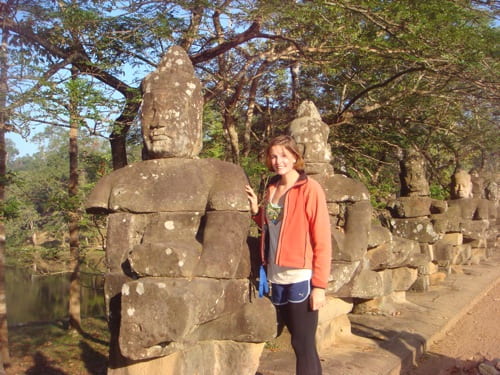Carolyn Balk
Trailblazer Foundation
Siem Reap, Cambodia
Hi! I am Carolyn, a junior at Gallatin concentrating in Culture Change and Globalization with a minor in Environmental Studies at CAS. In other words: how global interactions, intensified today by the media, have changed how societies all over the world recognize their identity and authenticity. I have particular interest in how tourism affects societies all over the world and in sustainable development of societies both environmentally and economically. I take great interest in Southeast Asia, having spent part of my gap year between high school and college in Cambodia as well as my spring 2012 semester in Indonesia.

This summer with the Gallatin Global Human Rights Fellowship will be working in multiple villages outside of Siem Reap, Cambodia with the Trailblazer Foundation. I also recently found out that I will be in a rural village homestay for at least part of my time there (do I know where / what the conditions are exactly? Nope. But I will cross that bridge when I come to it)! Trailblazer has the motto of “development through empowerment,” and this empowerment is especially necessary for obtaining human rights. More specifically with Trailblazer, I will be working on implementing sustainable drinking water filters. These filters lay the foundational pathway for the realization of other human rights. I am excited to see how grassroots and village-based development works in relation to and as a pathway for human rights. I also look forward to observing how villages receive filters and use technology for their benefit.
I believe that drinking water is an inherent and “indispensable” human right, and moreover acts as a gateway for other human rights to prevail. My work with Trailblazer will advance not only the right to water, but also the other human rights that depend on access to clean water such as health and dignity.
Many people often think of water scarcity as a problem that only occurs in deserts; however, access to clean drinking water is a major concern in tropical countries as well. There are three major bodies of water in Cambodia—the Mekong River, Tonle Sap Lake, and the Bassac River—the problem is accessing this water in a clean and sustainable fashion. Other Southeast Asian nations have a significantly higher percent of citizens with clean drinking water access; for example, in Thailand 98% of citizens have access—proving that it is possible (Brinkley 255). Cambodia, still recovering from the 1975-1979 Khmer Rouge genocide and a civil war that did not end until 1998, does not yet have the infrastructure or good governance to secure clean drinking water, and today only 14% of Cambodians have direct access to clean water (Brinkley 255). Many Cambodians, under the age of five especially, suffer from preventable diseases due to unclean water, impeding the society’s development and well-being on multiple levels. Most Cambodians in rural areas and city peripheries, except for Phnom Penh that has a remarkable yet localized piped water system, must rely on simple filtration techniques, purification tablets, or trucks that come to villages sporadically with water. Higher technology filters are much preferred to secure clean water as opposed to these current methods.
Although piped water throughout all of Cambodia, not just Phnom Penh, would be ideal, many NGOs and government officials see this as currently impossible due to the vast amounts of corruption in the government halting any potential progress in this sector. The Cambodian government in 2015 promised that 50% of rural people would be with drinking water, and in 2025, 100%; however, no money has been dedicated to this project as yet (Brinkley 256). In Phnom Penh, piped drinking water is available in 92% of the city for an economical $4 a month, whereas before 1993 and the first free elections, unsecured and often dirty drinking water in Phnom Penh was $1 a day—a price many Cambodians cannot afford (Gifford). In order to help all of Cambodia obtain drinking water access, it is left to mainly international organizations and NGOs to help as much as they can, mostly by providing either inexpensive or free filters. That being said, the World Bank, a subsidiary of the United Nations, along with other international bodies promote a privatized as opposed to government-funded water system in Cambodia. The problem with a private water system, although more likely to be completed in a timely manner than a state-organized system due to Cambodia’s corruption, is that the prices can be extremely expensive and wholly unaffordable for most Cambodians—cancelling out their potential success.
Clean drinking water overall is the first part of a positive domino effect as it leads to improved health, and subsequently more energy to work, more time to go to school, more stamina to participate in the government, and overall more agency among the Cambodian people. Clean drinking water allows for a “better standard of life,” as the United Declaration of Human Rights says, and is vital for future progress and development in a society.
Works Cited:
Brinkley, Joel. Cambodia’s Curse: The Modern History of a Troubled Land. New York, New York: PublicAffairs, 2011. Print.
Gifford, Rob. “Phnom Penh’s feat: Getting Clean Tap Water Flowing.” NPR. 02 June 2011. Retrieved from http://www.npr.org/2011/06/02/136394058/phnom-penhs-feat-getting-clean-tap-water-flowing. Web.